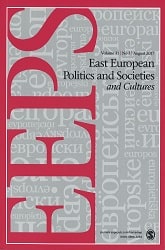Post-Communism, the Civilizing Process, and the Mixed Impact of Leninist Violence
Post-Communism, the Civilizing Process, and the Mixed Impact of Leninist Violence
Author(s): Jeffrey Kopstein, Michael H. BernhardSubject(s): Political history, Government/Political systems, Studies in violence and power, History of Communism, Post-Communist Transformation
Published by: SAGE Publications Ltd
Keywords: Leninism; violence; Moore; Elias; post-communism;
Summary/Abstract: Leninism and the central role that violence played in it is most commonly presented as a hindrance to democratic development in post-communist Eastern Europe. This paper reconsiders this proposition in light of the classics of comparative historical analysis. These classic works maintain that the long-term consequences of revolutionary violence sometimes counteract its short-term anti-democratic impact. Social change unleashed by revolution can contribute to the emergence of democracy in subsequent periods by removing pre-modern barriers to democracy. Two aspects of Leninist violence are highlighted as having such effects: forced modernization and the civilizing process. Communist modernization altered pre-modern social structures which had served as impediments to democracy prior to the Leninist seizure of power. The resulting social structures and the values reinforced by the communist version of the “civilizing process,” patterned on those of bourgeois conventions of the early twentieth century, helped some post-communist countries overcome obstacles to the introduction of liberal democracy encountered in earlier attempts in the region after World War I.
Journal: East European Politics and Societies
- Issue Year: 29/2015
- Issue No: 02
- Page Range: 379-390
- Page Count: 12
- Language: English
- Content File-PDF

